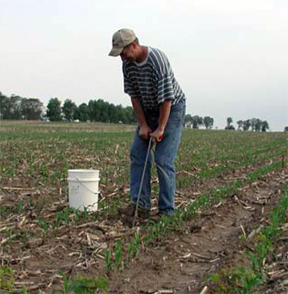Money saved with manure nutrients
Editor’s note: This article is from the archives of the MSU Crop Advisory Team Alerts. Check the label of any pesticide referenced to ensure your use is included.
How
would you like to save $40, $60 or even $100 per acre on manured fields?
Plan to take pre-sidedress nitrate soil tests (PSNTs) on fields going
to corn or other high nitrogen user crops.
The PSNT will be especially valuable this year due to all the rains,
which may have moved nitrogen out of the root zone. This soil test will
quantify the plant available nitrogen, and takes the guess work out of
estimating how much N is there from manure applications. The PSNT can
also measure nitrogen from other sources such as past alfalfa and
soybeans crops, compost or bio-solids.
PSNTs need to be taken following these guidelines.
Timing. Take the soil test about five-14 days ahead of
sidedress. Samples taken too early will not be as accurate since the
soil is releasing nitrate continually in the spring.
Priority fields to test. Test fields that will be corn
or other high nitrogen demand crops. Test fields that have been manured
this year or last year and fields that were alfalfa, clover or beans in
2008. Sample fields with a range of past conditions and compare the
results, such as testing fall applied manure compared to spring applied,
or pen pack compared to liquid storage.
Cautions. The PSNT will not be accurate in measuring soil
nitrate if fertilizer nitrogen has already been applied, such as plowed
down, large amounts (greater than 40 lbs) broadcast at planting or with
pre-emerge herbicides. Nitrogen placed in a starter band can be avoided
during sampling whereas broadcast applications cannot.
Taking the sample. Soil samples should represent no more than
20 acres. The sampled area should be consistent for past crop, soil
types and manure applications. Probe the soil 12-inch deep if possible,
taking 15-20 cores per field. Indicate the sampling depth on the soil
lab forms.
Handling samples. Air-dry samples as soon as they are taken. Do
not put damp soil samples in plastic bags. If the soil samples cannot
be dried right away, keep them cool, less than 50°F.
Delivering samples to the lab. Deliver samples to a soil testing lab to speed results or express mail air-dried soil.
Using the MSU Soil and Plant Nutrient Lab.
Cost for nitrate soil samples is $10 per sample, (plus one dollar to
have all the reports faxed rather than mailed, which is encouraged). The
fee must accompany the samples. The lab is open 8:00 AM to 5:00 PM,
Monday through Friday, phone (517) 355-0218. For sample bags and forms,
contact your local MSU Extension office. Other commercial labs are also
available.



 Print
Print Email
Email





